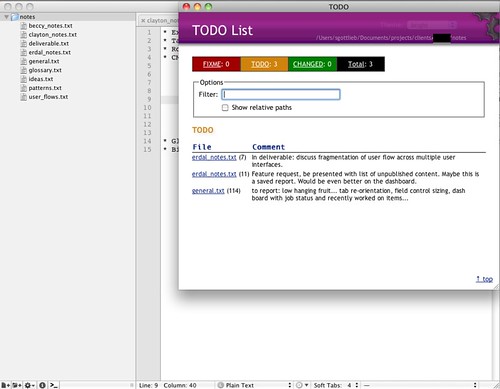Open formats in personal knowledge management
I have a complicated relationship with personal information management (PIM) tools. I love PIM software and services that promise to remember everything that I once knew. I am tempted by every new information gadget that comes down the pike. But I have also been burned lots of times too. I spent hours on corporate intranets documenting my knowledge only to have them shut down. I used proprietary software like the The Brain which became inaccessible when I switched computing platforms (note: now The Brain supports Linux and Mac OSX as well as Windows). My Google notebooks are now barely supported by Google. And now we have news of Delicious's uncertain future.
Because of these experiences, I have been fighting my urges to use services like Evernote, SpringPad, Yojimbo, etc.. Instead, I have been sticking with humble text files. In an earlier post, I described how I am using TextMate as a blogging tool. I have started to use it as a knowledge management tool as well.
I don't pretend that I have the features that products like Evernote do, but here is what I can do:
-
Create notebooks with multiple pages by using TextMate's project feature.
-
Organize pages into folders.
-
Create todo items and other tags that I can summarize by using the ToDo bundle
-
Search using "Find in Project" or Spotlight.
-
Collaborate with others using GitHub or another code hosting service.
-
Store and organize binary files like diagrams created in OmniGraffle.
The truth for me is that the greatest benefit of any PIM tool is simply the act of recording and organizing the information. These activities help me remember and process information into actionable knowledge in my head. You can do that with any tool. The second most important aspect is search and recall. This is where the open format of text files really excels. It would be really frustrating to try to retrieve some information but not have access to the software to consume it.
